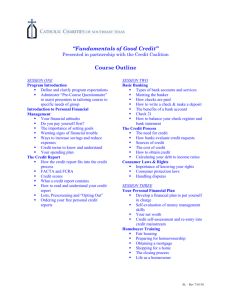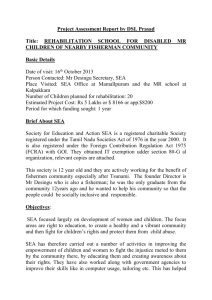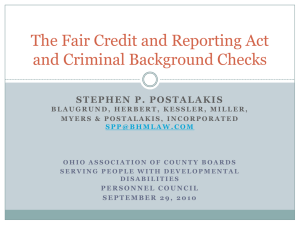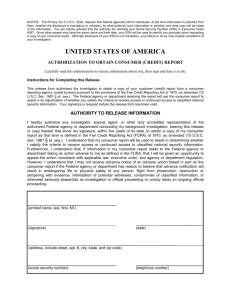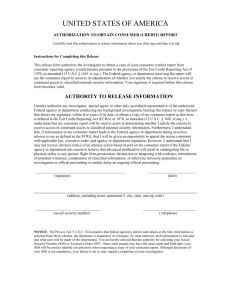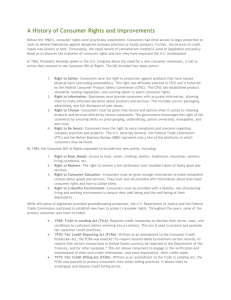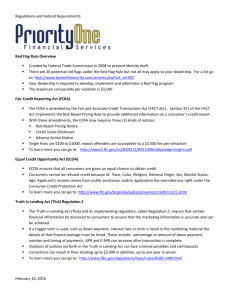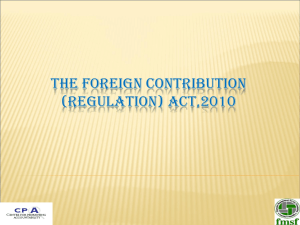- PuneICAI - Pune Branch Of WIRC
advertisement
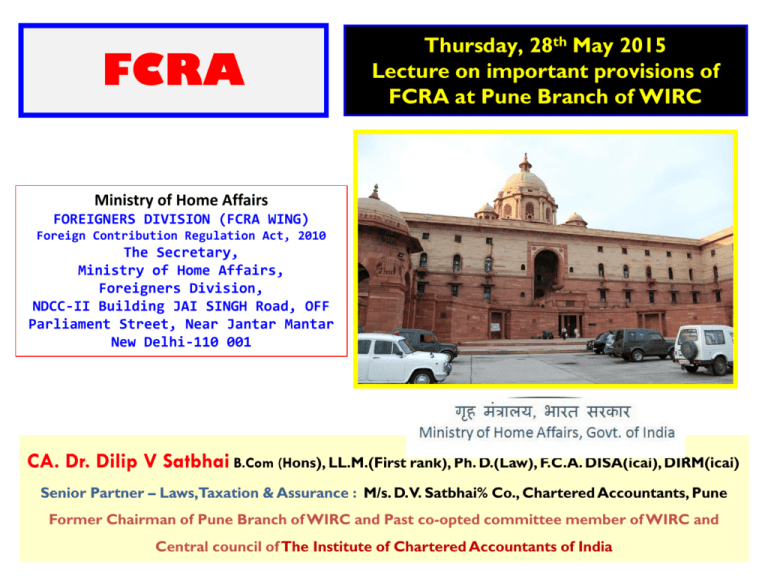
FCRA Thursday, 28th May 2015 Lecture on important provisions of FCRA at Pune Branch of WIRC Ministry of Home Affairs FOREIGNERS DIVISION (FCRA WING) Foreign Contribution Regulation Act, 2010 The Secretary, Ministry of Home Affairs, Foreigners Division, NDCC-II Building JAI SINGH Road, OFF Parliament Street, Near Jantar Mantar New Delhi-110 001 CA. Dr. Dilip V Satbhai B.Com (Hons), LL.M.(First rank), Ph. D.(Law), F.C.A. DISA(icai), DIRM(icai) Senior Partner – Laws,Taxation & Assurance : M/s. D.V. Satbhai% Co., Chartered Accountants, Pune Former Chairman of Pune Branch of WIRC and Past co-opted committee member of WIRC and Central council of The Institute of Chartered Accountants of India A brief history of FCRA • Ancient India is credited with many innovations: the zero, the modern numeral notation and yoga to name just a few. However, few know that this innovative streak has continued in modern times as well. For example, in 1976, India became the first nation to invent controls over international charity. • This was in the form of FCRA 1976. This law asked all the NGOs to tell the government how much funds they receive from foreigners. The law was refined in 1984- NGOs could not accept foreign funds without government permission. • In 2010, the law was reinforced further. Charitable individuals were also brought into the net. The law was made more rigorous: periodic renewals, restrictions over use of funds, cap on administrative expenses, were introduced. • And the world has followed in India's wake. Similar laws have been passed in Bangladesh, Indonesia, Egypt, Ethiopia, Russia and Venezuela, among others. • Pakistan, Sri Lanka might also follow suit. Executive Summary – (Annual Report) • Top Country: USA has been the top donor country. (Rs: 3,260.22 crores) • Top Donor: Compassion International, USA has contributed the maximum amount of foreign contribution as a single donor organization. (Rs: 99.20 crores) • Top Recipient State: The State of Delhi has received the highest amount of foreign contribution. (Rs: 2017 crores), next TN (Rs: 1557 crores) and AP (Rs: 1177 crores) • Top Recipient District: Among the Districts, Bengaluru has received the highest amount of foreign contribution. (Rs: 774.09 crores), followed by CHENNAI (Rs: 772.67 crores) • Top Single Recipient: Among the recipient associations, World Vision of India, Chennai received the highest amount of foreign contribution. (Rs: 233.74crores) • Utilization: The highest amount of foreign contribution was utilized for Establishment expenses. (Rs: 1,337.15 crores out of Rs: 10,334 crores) – 13% approx Précis – FCRA – Past to Present (Latest) • The total number of associations registered as on 31.03.2015 is 46,149 • The total receipt of Foreign Contributions reported by 22,702 associations during the year 2011-12 was Rs 11,550 crore • The total receipt of Foreign Contribution during 2012-13, as reported by 16,896 associations till 31.03.2015 is Rs 10,875.06 crore. Précis – FCRA – Past to Present • Yearly – 2000 (registrations) + 500 (prior approvals) applications are approved on an average (2139 + 393 for the year 2010-2011) • As on: 31st MARCH 2012:- registered entities are 43,527 • Compliance: As such 55% of registered entities only File (New ) Form FC –6 • Non-compliance: Still 45% of the registered entities do not file (New) Form FC-6: quite consistent in non-compliance • So far: In 91–92: 1400 crores; In 01-02: 4800 crores; In 11-12: 12000 crores – Annual Growth Rate – 12% approx • Majority: Out of 40000+ registrations 85% and above are Christian and hardly 15% are other religions (Buddhist + Hindu + Muslim + Sikh) Synopsis - FCRA Out of 43000+ entities – only 3% (1200+) entities received more than Rs: 1 crore From 178 countries – contributions are received: Top 10 are (US + Germany + UK + Netherlands + Switzerland + Spain + Canada + France + Belgium) 38th year of inception of since repealed FCRA, 1976 Only one amendment so far in 1985 with retrospective effect from 24th Oct 1984 New FCRA, 2010 and FCRR, 2011 is effective from 1st MAY 2011 onwards. Spotlight: The new law is not much different from old law. In fact, they could have effortlessly modified the 1976 Act itself. Preamble FCRA • To regulate the acceptance and utilisation of Foreign Contribution or Foreign Hospitality by certain Individuals/ Associations/ Companies • To prohibit the acceptance and utilization of Foreign Contribution or Foreign Hospitality for any activities detrimental to the national interest. • FCRA, 1976 – 32 Sections, FCRR, 1976 – 9 Rules • FCRA, 2010 – 54 Sections, FCRR, 2011 – 24 Rules Eligible entities under FCRA • Society – Registered under Societies Registration Act, 1860 • Trust – Governed under Indian Trusts Act, 1882 • Company – Under Section 25 of The Companies Act, 1956 • Individual / HUF – Section 2(m) of FCRA, 2010 – Defines “Person”. Home Minister 22nd Home Minister Shri Raj Nath Singh Minister of State for Home Affairs Shri. KIREN RIJUJU MINISTER OF STATE Home Secretary Shri. ANIL GOSWAMI Additional Secretary (Border Management) Joint Secretary (Foreigners) Significant Changes in FCRA 2010 Section 2(h) 11(3)(iv) 12(d)/12(e) 13 14(e) Focus Business / consultancy income not part of foreign contribution [Explanation 3] MHA may obstruct specific sources / donors Questionable powers given to department for rejecting an application Suspension of certificate ‘No reasonable activity’ will result in cancellation 15 MHA can manage all FC assets & funds – [FC Assets Management Authority] 16 Renewal of registration every 5 years 17 Multiple Bank account allowed 22 Disposal of fixed assets on dissolution. Forms in FCRR, 2011 FC Rule 1 6 2 7(1) Subject / Purpose Intimation to CG of receipt of FC by way of gift from relative Application for seeking prior permission of the CG to accept foreign hospitality 3 9(1)(a) Application for Registration u/s. 11(1) of FCRA, 2010 for acceptance of FC 4 9(2)(a) Application for Prior Permission u/s. 11(1) of FCRA, 2010 for acceptance of FC 5 12(2) Application for seeking renewal of Registration Certificate u/s. 13 of FCRA, 2010 6 17(1) Account of FC for the year ending on the 31st March ….. 7 17(3) Intimation about FC(Articles) Account 8 17(4) Intimation about FC(Securities) Account 9 18 Intimation to CG of Receipt of FC received by a candidate for Election u/s. 21 of FCRA, 2010 10 24(1) Application for seeking permission for transfer of FC to other Registered / Unregistered persons Foreign Source • Individuals – NRIs and PIOs • Government of a foreign country / territory (recognized / unrecognized) • International Agencies (except 104) • NPO – Trusts / Foundations / Society, Clubs / Trade Unions • Business Organisations – Foreign Company / Subsidiary of a foreign company / foreign corporation / MNC / Company controlled by foreigners (>50%) Individuals • How do you know whether a person is foreigner or not? This is based on his or her citizenship. The country of stay is not important. • Foreigner in India: This means that a foreigner staying in India, working in India, earning money in India, will still remain a foreign source. • Indian Outside India: On the other hand, an Indian working abroad, getting salary from a foreign company, will not be a foreign source. An example of this category is Mr. Amartya Sen • Vice-versa situation: On the other hand, if a foreigner acquires Indian citizenship, then he or she will become an Indian source. Similarly, if an Indian becomes a foreign citizen, then he or she will become a foreign source. • A common area of doubt is NRIs, PIOs and OCIs • Are NRIs a foreign source or Indian source? In general, NRIs are not a foreign source. They are settled abroad but are still Indian citizens. • NRI: However, the term NRI is sometimes used very casually. Therefore, it is best to confirm this by asking whether the person has become a foreign citizen. If the answer is ‘no’, then the funds will be treated as Indian. • PIO: Persons of Indian origin are treated as a foreign source. It does not matter whether they hold the PIO card or not. • OCI: Similarly, OCIs – Overseas Citizens of India (ex: USA) are treated as a foreign source. NRIs, PIOs & OCIs How about Dual Citizenship? Or When Indian Citizens are treated as Foreign Source? • Who is a DC? The Government is now also seriously talking about dual-citizenship. This means that an Indian can remain an Indian citizen, even though he or she becomes a foreign citizen. • Will this make a difference so far as FCRA is concerned? Surprisingly, the answer is ‘no’. • Under FCRA, 2010 – u/s 2(1)(j), sub-clause (x) clearly says that a citizen of a foreign country is a foreign source. • In the case of dual-citizenship, a person will be an Indian citizen but will also be a foreign citizen. Thus, he or she will attract clause (x) and will be treated as a foreign source! Can an Indian Company be a Foreign Source? The following well-known Indian companies are classified as foreign source under FCRA: • Bata India Ltd. • Britannia Industries Ltd. • Hindustan Unilever Ltd. • Housing Development Finance Corporation Ltd (HDFC) • ICICI Bank Ltd • IDFC Ltd • ING Vysya Bank Ltd • ITC Ltd. • Jet Airways (India) Ltd • Maruti Suzuki India Ltd • MphasiS Ltd. • Sesa Goa Ltd. • Siemens Ltd. Watch your step!!! • Under the Companies Act, an Indian company means a company formed and registered in India. • A foreign company means a company formed abroad. Things are different with FCRA. • Under FCRA, an Indian company is an Indian source, only if it is controlled by Indian citizens, companies, etc. If the control passes into the hands of foreigners, then it becomes a foreign source. For example, if foreigners hold 51% or more of the shares in an Indian company, it automatically becomes a foreign source. FCRA 2010 – Section 2(g) and 2(j) • 2(1)(g) – Foreign Company • 2(1)(j) – Foreign Source • The FCRA 2010 has defined a foreign company under clause (g) of Section 2(1), which does not include Indian Companies. However section 2(1)(j) which defines the term ‘foreign source’ includes an Indian company under the category of foreign source if more than 50% of its equity is held by foreigners. • This clause is apparently inserted to exclude Indian companies having more than 50% of foreign equity holding. FC Receivers • Political Parties (Prohibited) • Organizations' of a political nature (with prior permission) • Individuals in Public Life • NGOs • Private Individuals (no restriction except scholarship) • Business Organizations' (no restriction) FCRA 2010 – Business/consultancy income of an NGO • In the old FCRA 1976 had no clarity. • In FCRA 2010, explanation 3 to section 2(1)(h) excludes income from business, trade or commerce. • This amendment was very necessary but it comes with a lot of potent controversies and trouble for the NGOs. • This section states that any fee or cost against business, trade or commerce shall not be considered as foreign contribution. • In other words, such receipts can be treated as local income. Explanation 3 to Section 2(1)(h) • Explanation 3 : Any amount received, by any person from any foreign source in India, by way of fee (including fees charged by an educational institution in India from foreign student) or towards cost in lieu of goods or services rendered by such person in the ordinary course of his business, trade or commerce whether within India or outside India or any contribution received from an agent of a foreign source towards such fee or cost shall be excluded from the definition of foreign contribution within the meaning of this clause; Section 11(3)(iv) • 11(3) Notwithstanding anything contained in this Act, the Central Government may, by notification in the Official Gazette, specify – • (iv) the source or sources from which the foreign contribution shall be accepted with the prior permission of the Central Government. Section 12(4) – Questionable powers! for rejecting an application • (d) in case the person being an individual, such individual has neither been convicted under any law for the time being in force nor any prosecution for any offence pending against him; • (e) in case the person being other than an individual, any of its directors or office bearers has neither been convicted under any law for the time being in force nor any prosecution for any offence is pending against him; Section 16: Renewal of Certificate • The FCRA 2010 provides for renewal of registration of NGOs every 5 years. However, the Act has provided relief to all the existing NGOs for the first 5 years from the date of enactment. • In other words, all existing NGOs have to renew their registration at the end of the period of 5 years from the date of enactment of FCRA 2010. • As per Section 16 of the Act, all NGOs should apply for renewal of the certificate within 6 months prior to the expiry of the five year period. Last date for renewal application Registration Expiry date 6 months Rule 12: Renewal of Registration Certificate • What: Every COR to be renewed after the expiry of 5 years from the date of its issue • How: Application in Form FC-5 • When: Six months before the expiry of the COR (for on-going multi-year project twelve months before the expiry of COR) • Fee: Rs: 500/- Caution: If no application is made within 6 months of expiry of COR, the validity will be ceased from the date of completion of period of 5 years. • Consequences: on deemed expiry, the funds received in bank will be in violation of FCRA, 2010 • Once COR ceased, fresh application is to be made in Form FC-3 again…..(careful) • Condonation of Delay: Is accepted, if application made with reasonable causes within 4 months from the expiry of COR Section 17: FC through scheduled bank • Section 17 of FCRA 2010 provides that multiple bank accounts can be opened for the purposes of utilisation provided only one bank account is maintained for receiving foreign contribution. • This amendment provides a great relief to all the NGOs which were struggling under the arbitrary disallowance of multiple bank accounts under current FCRA. Rule 13: Receipt of FC in excess of 1 crore rupees • Applicable: Registered entities and for prior permission entities • Period: In a financial year • Amount: In excess of 1 crore i.e. (Rs: 1,00,00,001 and above only. ) • Condition: Summary data to be placed in Public domain viz. website of the NGO, in addition it will also be displayed / uploaded in the website of the Ministry of Home Affairs. Rule 6: Intimation of receiving FC from relatives • Applicable: Any person receiving • Amount: Excess of Rs: 1 Lakh or equivalent from any of his relatives • Who: “relative” has the meaning assigned to it in clause (41) of section 2 of the Companies Act, 1956 • Form: FC-1 giving PAN of the recipient and Income Tax details of the relative abroad • Time: Within 30 days from the date of receipt Contradiction:? No No permission is required to obtain foreign contribution from a relative under section 4 which is a relaxation. However, rule 6 provides that any gift from relatives above ` 1,00,000/- in one year shall be intimated to the FCRA department in Form FC-1. Rule 24: Procedure to transfer FC to other registered / unregistered entities Double Check: Transferor to reflect in Form FC-6 and Form FC-10 & Recipient to reflect in Form FC-6 Who: Any person intending to transfer FC who has been granted COR or PP (exception sub-rule 3) Form: FC-10 to be applied by the transferor association Limit: If the recipient is a unregistered entity, the limit is 10% of total value of FC received (in a year?) – sub-rule 2(a) Countersign: The application must be countersigned by the District Magistrate having Jurisdiction over the place where the transferred funds are sought to be utilized (transferee Jurisdiction Magistrate) Time to be taken by Magistrate: 60 days of the receipt of such request Control: The donor should not transfer till the approval is granted. Caution: Wait till MHA approval for transfer Prior Permission • Prior-permission is given to NGOs by FCRA department to accept foreign contribution on a case-by-case basis. • This permission should be obtained before accepting the contribution. • However, if NGOs are going to receive foreign funds regularly, they should get ‘FCRA Registration’, so that they don’t have to apply for permission again and again. When Prior Permission is needed? • An NGO would need prior permission in the following four situations: 1. The NGO does not have an FCRA number (permanent FCRA registration); 2. The FCRA number has been cancelled by the Government; 3. The NGO has been asked to get prior-permission under section 10(b); 4. The FCRA number is ‘frozen’ due to change in Governing Body. Procedure for Prior Permission – Role of CAs • Statute: Section 11(2) and Rule 9(2)(a) • Who: Individual / HUF / Association / Company • Application: Apply in Form FC-4 electronically • Necessity: Followed by Hard copy – Duly signed by the Chief Functionary together with relevant documents (Project report, commitment letter). Hard copy should reach 30 days from e-filing failing which application will be rejected. • Caution: Once delayed have to wait for SIX months for next / fresh application. No Second application within SIX months • Bank Account: An exclusive bank account opened for receipt of FC and one or more multiple bank accounts later opened and informed later within 15 days. (no format) • Fees: Rs: 1000 /- • Appeal: Against rejection of application ca be made u/s. 31 Section 12(4): Conditions to be satisfied for Prior Permission i. is not fititious or benami; ii. has not been prosecuted or convicted for indulging in activities aimed at conversion through inducement or force, either directly or indirectly, from one religious faith to another; iii. has not been prosecuted or convicted for creating communal tension or disharmony in any specified district or any other part of the country; iv. has not been found guilty of diversion or mis-utilisation of its funds; v. is not engaged or likely to engage in propagation of sedition or advocate violent methods to achieve its ends; vi. is not likely to use the foreign contribution for personal gains or divert it for undesirable purposes; vii. has not contravened any of the provisions of this Act; viii. has not been prohibited from accepting foreign contribution; The person making an application for prior permission has prepared a reasonable project for the benefit of the society for which the foreign contribution is proposed to be utilised; FCRA Registration • FCRA Registration means registration under Foreign Contribution (Regulation) Act, 2010. • This is necessary, if an NGO wants to receive any funds, material, securities etc. from a ‘foreign source’. How to Register? – Role of CAs • Statute: Section 11(2) and Rule 9(1)(a) • Who: Association / Section 25 Company • Application: Apply in Form FC-3 electronically On-line filing • Necessity: Followed by Hard copy – Duly signed by the Chief Functionary together with relevant documents (Recommendation Certificate, Project Report of Activities, Audit Report). Hard copy should reach 30 days from e-filing failing which application will be rejected. • Caution: Once delayed have to wait for SIX months for next / fresh application. No Second application within SIX months • Bank Account: An exclusive bank account opened for receipt of FC and one or more multiple bank accounts later opened and informed later within 15 days. (no format) • Fees: Rs: 2000 /- • Appeal: Against rejection of application ca be made u/s. 31 Section 12(4): Conditions to be satisfied for Registration i. is not fititious or benami; ii. has not been prosecuted or convicted for indulging in activities aimed at conversion through inducement or force, either directly or indirectly, from one religious faith to another; iii. has not been prosecuted or convicted for creating communal tension or disharmony in any specified district or any other part of the country; iv. has not been found guilty of diversion or mis-utilisation of its funds; v. is not engaged or likely to engage in propagation of sedition or advocate violent methods to achieve its ends; vi. is not likely to use the foreign contribution for personal gains or divert it for undesirable purposes; vii. has not contravened any of the provisions of this Act; viii. has not been prohibited from accepting foreign contribution; • The person making an application for registration has undertaken reasonable activity in its chosen filed for the benefit of the society for which the FC is proposed to be utilised; Issues in Registration • Only registered NGOs (Society, Trust, Section 8 Company) • 3 years existence (mandatory mention in point No: 3 of Form No FC-3) • No foreigners on Governing Body (a unwritten rule, better to avoid from unnecessary questions) • Time frame – 90 Days • Reasons for refusal – to be communicated in writing to the applicant – proviso to section 12(3) • Undertaking (New Format of FC-3) Undertaking (in Form FC-3) There are 4 items to understand before signing the form: 1. Changes in society: If NGO change the name, address, registration, nature, aims or objects of the association at any time, they have to inform the FCRA within 30 days. 2. Changes in office bearers: The office bearers of the NGO specified in form FC-3 become ‘frozen’. This means that more than 50% of these office bearers should continue in office. Otherwise, prior permission for change to be applied. 3. Change in bank: If NGO change the FCRA bank or branch, they will have to apply to FCRA for permission. This can be done on the proforma available on ministry website. They will also need to give satisfactory reasons for this change. 4. Temporary suspension: Of credit in FC Bank account till Registration Certificate / Prior Permission is granted. List of enclosures attached with the application are: Certificate from concerned District Collector / District Magistrate / Department of State Government/ Ministry or Department of Central Government Activity report for past 3 years (or annual reports for 3 years) Audited Statements of Account for past 3 years (Balance Sheet, Income and Expenditure, Receipts and Payments Account along with audit report) List of states or districts the NGOs will be working in A note on socio-economic background of the beneficiaries and of the region to be covered FC-6 • Statute: Rule 17 • Who: should file FC-6: Every person who received FC • New: Column No: 14 added specifying: Places with address of specific activities • When: Due Date within 9 months from end of FY (31st December) • Annual: File it each year • Along with: IE Account, RP Account and BS • FC-7: For articles • FC-8: For foreign securities • Your attention please: Form FC-6, FC-7 and FC-8 all duly certified by CA • Retention Period: 6 years • Even ‘NIL’ report is mandatory Advisory to incur expenditure above Rs: 20000/- by cheques / drafts The Ministry of Home Affairs has issued a Circular [F.No. II/21022/58(136)/2014-FCRA(MU)] dated 21st October 2014 an advisory to associations registered/ granted prior permission under FCRA to incur expenditure above Rs: 20000/- by cheques / drafts. The government advises all FCRA associations to that items of expenditure / payments amounting to Rs: 20000/- or more should be done by cheques / demand drafts Intensive Scrutiny: It is also informed that records and accounts of associations indulging in cash payments of Rs: 20000/- or more from FC designated accounts or Utilisation accounts are likely to require more intensive scrutiny by government Penalty for delay in filing of FC-6 • The Ministry of Home Affairs has issued a notification (Notification No: 939, 29/04/2013) to the organisations registered under the Foreign Contribution Regulation Act to submit their FCRA Returns on time. • Accordingly any delay in filing of Annual Return will attract penalty ranging from 2% to 5% of the total foreign contribution received any NGO during the year. • The following table describes the penalties on non filing of FCRA return and officer competent for compounding # 1. Offences Amount of Penalty Officer competent of compounding Non-furnishing of FCRA Penalty of 2% of the amount The Director or Deputy return upto 90 days after Secretary in charge of the received during 31st December every year Foreign Contribution the Financial year or (Regulation) Act Wing of Rs.10,000/-, whichever is Foreigners Division in the MHA. higher. 2. Non-furnishing of return Penalty of 3% of the amount after 91 days upto 180 received during the st days after 31 December Financial year or every year The Director or Deputy Secretary in charge of the Foreign Contribution (Regulation) Act Wing of Rs.20,000/-, whichever is Foreigners Division in the MHA. higher. 3. Non-furnishing of return Penalty of 5% of the amount after 180 days after received during the st 31 December every year Financial year or The Director or Deputy Secretary in charge of the Foreign Contribution (Regulation) Act Wing of Rs.50,000/-, whichever is Foreigners Division in the MHA. higher, with Rs. 500/- per day of delay after 180 days. Suspension or Cancellation of Registration • Section 13 – Suspension of Certificate • Section 14 – Cancellation of Certificate • Section 15 – Management of FC of person whose certificate has been cancelled • Section 22 – Disposal of Assets created out of FC • Section 31 – Appeal • Section 32 – Revision of orders Compounding of Offences • FCRA 2010 has introduced a provision for compounding of offences. This allows the Government to enter into a compromise with the offending entity. They can pay a compounding fee, instead of facing court proceedings, and possibly a fine and imprisonment • What can be compounded?: In theory, all the offences under the Act are eligible for compounding. However, only notified offences can be compounded in practice. • Repeated Offence: If a similar offence is repeated by a person within 3 years, it cannot be compounded again Compounding of Offences… • Caution: Secondly, compounding is feasible only before prosecution is started. If a complaint has been filed in the court, then compounding is no longer an option. What is not an Offence?: 1. What happens if the money is transferred electronically into a person’s account, without their consent? This probably does not constitute an offence – till the time the person starts using the money. 2. If the offence is for not filing a document or filing it incorrectly? In such a case, the person may also be asked to file the missing document etc. before the offence is compounded Procedure for Compounding • How: Make an application on plain paper for this. The application should be addressed to The Secretary, Ministry of Home Affairs. The application will be decided by the Director or Deputy Secretary. • Fees: An application fee of Rs.1000 is to be paid for this. This is in addition to the penalty that may be levied if the Government agrees to compound the offence. # 1. Offences Accepting a cheque or draft for foreign contribution without registration or prior permission Amount of Penalty Rs. 10,000 or 2% of the foreign contribution involved, whichever is higher. # 1. Offences Accepting a cheque or draft for foreign contribution without registration or prior permission 2. Depositing a cheque or draft for foreign contribution without registration or prior permission Amount of Penalty Rs. 10,000 or 2% of the foreign contribution involved, whichever is higher. Rs. 25,000 or 2% of the foreign contribution involved, whichever is higher. # 1. Offences Accepting a cheque or draft for foreign contribution without registration or prior permission 2. Depositing a cheque or draft for foreign contribution without registration or prior permission 3. Accepting and using foreign contribution for specified purpose without registration or prior-permission Amount of Penalty Rs. 10,000 or 2% of the foreign contribution involved, whichever is higher. Rs. 25,000 or 2% of the foreign contribution involved, whichever is higher. Rs. 1,00,000 or 5%, whichever is higher. # 1. Offences Accepting a cheque or draft for foreign contribution without registration or prior permission 2. Depositing a cheque or draft for foreign contribution without registration or prior permission 3. Accepting and using foreign contribution for specified Amount of Penalty Rs. 10,000 or 2% of the foreign contribution involved, whichever is higher. Rs. 25,000 or 2% of the foreign contribution involved, whichever is higher. Rs. 1,00,000 or 5%, whichever is higher. purpose without registration or prior-permission 4. Accepting foreign contribution in kind Rs. 10,000 or 2%, whichever is without registration or prior permission higher. Chart showing Consequences of violating provisions of Foreign Contribution Regulation Act 2010 SR.No FCRA Nature of offence Contents Punishment 1 Sectio n 33: Making of false statement , declaratio n or delivering false accounts: Any person, subject to this Act, who knowingly, (a) gives false intimation under sub-section (c) of section 9 or section 18; or (b) seeks prior permission or registration by means of fraud, false representation or concealment of material fact, shall, on conviction by a court, be liable to imprisonment for a term which may extend to three years or with fine or with both. 2 Section 34 Penalty for article or currency or security obtained in contraven tion of Section 10: If any person, on whom any prohibitory order has been served under section 10, pays, delivers, transfers or otherwise deals with, in any manner whatsoever, any article or currency or security, whether Indian or foreign, in contravention of such prohibitory Order he shall be punished with imprisonment for a term which may extend to three years, or with fine, or with both; and notwithstanding anything contained in the Code of Criminal Procedure, 1973, the court trying such contravention may also impose on the person convicted an additional fine equivalent to the market value of the article or the amount of the currency or security in respect of which the prohibitory order has been contravened by him or such part thereof as the court may deem fit. 3 Section 35 Punishment for contravention of any provision of the Act: Whoever accepts, or assists any person, political party or organization in accepting, any foreign contribution or any currency or security from a foreign source, in contravention of any provision of this Act or any rule or order made there under, shall be punished with imprisonment for a term which may extend to five years, or with fine, or with both. 4 Section 36 Powers to impose additional fine where article or currency or security is not available for confiscation : Notwithstanding anything contained in the Code of Criminal Procedure, 1973, the court trying a person, who, in relation to any article or currency or security, whether Indian or foreign, does or omits to do any act which act or omission would render such article or currency or security liable to confiscation under this Act, may, in the event of the conviction of such person for the act or omission aforesaid, impose on such person a fine not exceeding five times the value of the article or currency or security or one thousand rupees, whichever is more, if such article or currency or security is not available for confiscation, and the fine so imposed shall be in addition to any other fine which may be imposed on such person under this Act. 5 Section 37 Penalty for offences where no separate punishment has been provided: Whoever fails to comply with any provision of this Act for which no separate penalty has been provided in this Act shall be punished with imprisonment for a term which may extend to one year, or with fine or with both. 6 Section 38 Prohibition of acceptance of foreign contribution: Notwithstanding anything contained in this Act, whoever, having been convicted of any offence under section 35 or section 37, in so far as such offence relates to the acceptance or utilization of foreign contribution, is again convicted of such offence shall not accept any foreign contribution for a period of three years from the date of the subsequent conviction. # Offences Amount of Penalty 1 Accepting a cheque or draft for foreign Rs. 10,000 or 2% of the contribution without registration or prior foreign contribution permission involved, whichever is higher. 2 Depositing a cheque or draft for foreign contribution without registration or prior permission 3 Accepting and using foreign contribution for Rs.1,00,000 or 5%, specified purpose without registration or whichever is higher. prior permission Rs. 25,000 or 2% of the foreign contribution involved, whichever is higher. Section 13 Suspension of Certificate • Who: The Central Govt. can suspend a registration upto 180 days by order in writing recording the reasons. • Caution: During this period, FC cannot be accepted and utilized or can be accepted and utilized only as per terms and conditions specified by CG. • Rule 14: (FCRR, 2011): 25% may be spent with prior approval, 75% shall be utilised after revocation of suspension of certificate of registration. • Only Hope: CG can revise the order under section 32 of FCRA • Tip: No appeal is provided against the order of suspension, but obviously writ petition can be filed. Section 14: Cancellation of Certificate • Reasons: Registration can be cancelled by CG after making enquiry and after giving opportunity of hearing • 1. Providing false information 2. Violating the terms and conditions like filing of return, etc. 3. Acting against public interest 4. Violating the Act or the Rules 5. No reasonable activity for 2 years or has become defunct Caution: Once certificate has been cancelled, they shall not be eligible for registration or grant of prior permission for a period of 3 (three) years from the date of cancellation of such certificate. • Procedure: CG can revise the order u/s. 32 of FCRA, Application to be made within 1 year from the date of communication of order. (Delay can be condoned, no time limit for Condonation) • Appeal against the order of cancellation lies with High Court under section 31(2) of FCRA (within 60 days). Section 31(2): Right to Appeal • Section 5: Listing as organisation of Political Nature • Section 12(2): Refusal to grant certificate of Registration or Prior Permission • Section 14(1): Cancellation of Certificate of Registration Who can appeal and what kind of orders are appealable? • An organization declared to be an organization of political nature • A person denied permission to accept foreign hospitality • A person or association denied prior-permission or FCRA registration • A person whose FCRA registration certificate has been cancelled Appeals against above orders must be made within 60 days of receipt of order. These appeals are to be made in the High Court Section 32: Revision of Orders • Who: The Central Government may, either of its own motion or on an application for revision by the person registered under this Act • Limitation on suo-moto revision – 1 year: The Central Government shall not of its own motion revise any order under this section if the order has been made more than one year previously. • Revision or Appeal: The CG shall not revise any order where an appeal against the order lies but has not been made and the time within which such appeal may be made has not expired or such person has not waived his right of appeal or an appeal has been filed under this Act. • How: Plain Paper (No format) • Fee: Rs: 1000/- (in Demand Draft / Banker’s Cheque in favour of “Pay & Accounts Officer”, MHA, payable at New Delhi) • Where: The Secretary, MHA, GOI, New Delhi. Rule 15: Custody of FC in respect of person whose certificate has been cancelled • With Whom: The amount of FC lying unutilised in the exclusive FC bank account of a person whose certificate of registration has been cancelled shall vest with the banking authority concerned till the CG issues further directions. (Account will be freezed) • Caution if transferred: If a person whose certificate of registration has been cancelled transfers/has transferred the FC to any other person, the provisions of sub-rule (1) of this rule shall apply to the person to whom the fund has been transferred. Section 15: FCAMA – FC Asset Management Authority • FCRA 2010 provides that after cancellation of registration certificate all the FC and assets thereof shall vest with such authority as may be prescribed. • The government authorities shall take charge of the foreign contribution and the FC assets till the registration is restored. • This seems to be a very harsh provision because it is open ended. • Outcome: In other words FC assets created since the inception of the organisation can be implicated if the registration certificate is cancelled. Section 22: Disposal of assets created out of FC • Where any person who was permitted to accept FC under this Act, ceases to exist or has become defunct, • All the assets of such person shall be disposed of in accordance with the provisions contained in any law for the time being in force under which the person was registered or incorporated, and • In the absence of any such law, the CG may, having regard to the nature of assets created out of FC received under this Act, by notification, specify that all such assets shall be disposed of by such authority, as it may specify, in such manner and procedure as may be prescribed. Role of CAs in FCRA, 2010 & FCRR, 2011 Role of CAs 1. Charter for the CA: • To Verify whether associations are eligible to receive FC • To Guide in submission of application for registration / prior permission • To Ensure that the associations receives and utilizes the FC through its exclusive Bank Accounts • To Assist in proper maintenance of Books of Accounts • To Ensure that the annual returns are prepared in accordance with the provisions 2. Maintenance of Accounts; Audit of Accounts 3. Representations – seizure / confiscation 4. Filing of Returns 5. Preparation of FCRA Balance Sheet (Cash Basis?) 6. Certification & Secretarial Practice Thank You !!
